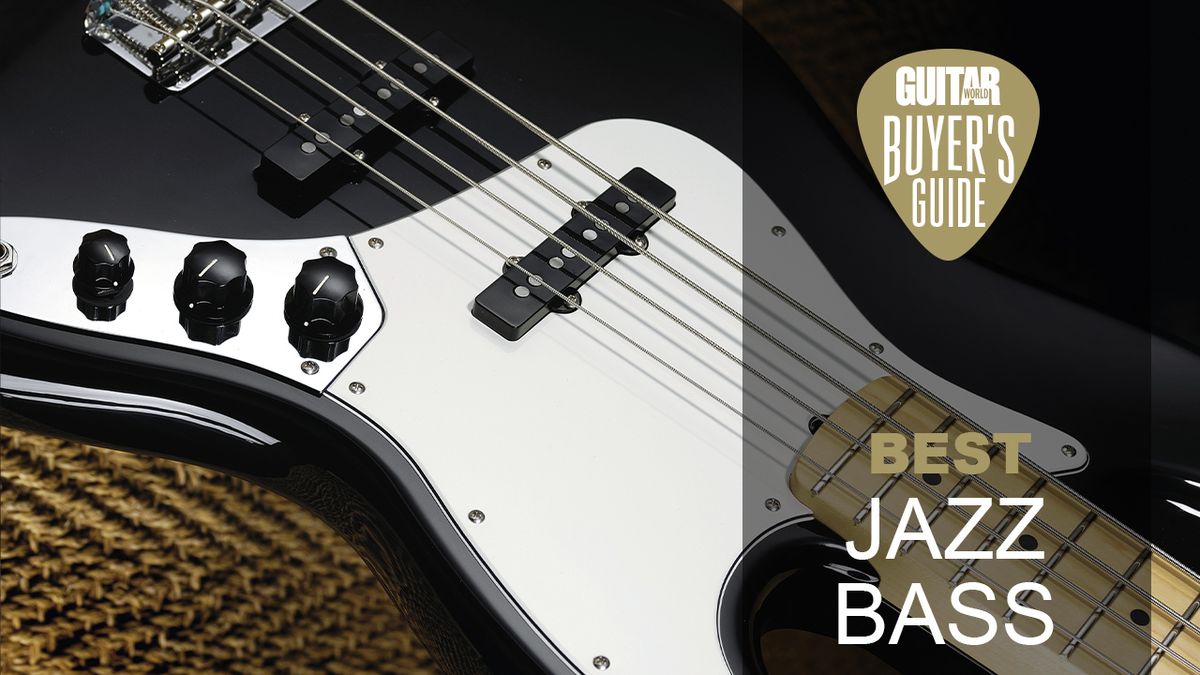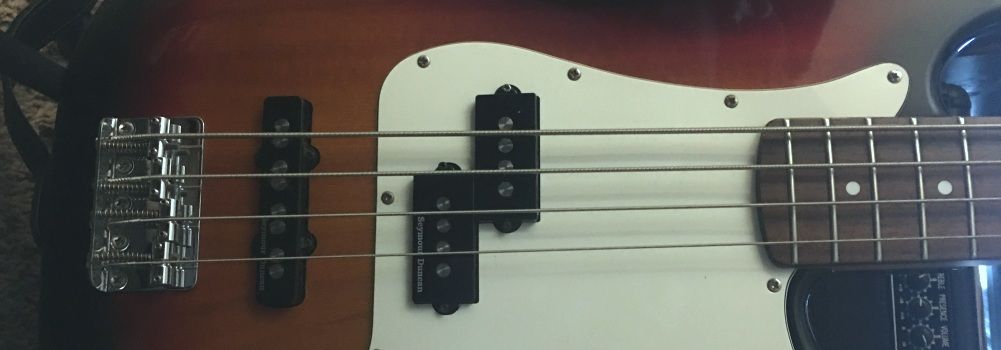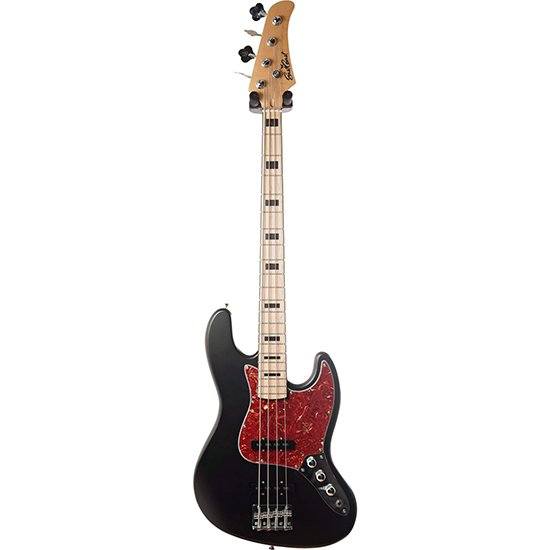The Fender Jazz Bass is widely acclaimed as the best bass guitar for jazz. This versatile instrument offers rich tones perfect for jazz’s complex rhythms.
For jazz enthusiasts and bassists seeking the ideal instrument, the Fender Jazz Bass emerges as a clear favorite. Renowned for its smooth playing feel and dynamic range, it delivers the warm, rich sounds that have become synonymous with jazz music.
Musicians value its reliability, the iconic design that combines both vintage aesthetics and modern functionality, and the variety of tonal options that cater to different styles within the jazz genre. From sultry ballads to upbeat numbers, the Fender Jazz Bass adapts with ease, making it an integral tool for both performing and recording artists who require a high-quality sound that captures the essence of jazz.

Credit: www.guitarworld.com
Introduction To Jazz Bass Guitar
The heart of jazz music often pulses to the rhythm set by the bass guitar. Serving as a pivotal bridge between melody and rhythm, the bass guitar not only provides the fundamental notes that shape the harmonic structure but also paces the grooves that make jazz toe-tappingly irresistible. Finding the right one for jazz, however, involves a journey through soundscapes, craftsmanship, and history. Let’s delve into what defines the optimum jazz bass guitar.
Defining The Role Of The Bass In Jazz
In a jazz ensemble, the bass holds a multifaceted role. It functions as the musical cornerstone that anchors the harmonic framework and drives the ensemble’s rhythm. The bassist must exhibit versatility, often shifting between walking bass lines, melodic solos, and supportive grooves. As such, selecting a bass guitar tailored for jazz necessitates a nuanced understanding of its role.
Characteristics Of An Ideal Jazz Bass Guitar
The quintessential jazz bass guitar possesses several defining characteristics that cater to the genre’s demands. These include:
- A rich, warm tone that blends smoothly within a band setting
- Responsive pickups with a wide dynamic range
- A comfortable neck profile that enables complex fingerings and fast runs
- Lightweight body for prolonged playing with ease
- Quality hardware that offers stability and consistent intonation
The ability to showcase expressiveness and articulate notes with clarity is also paramount, making both playability and sound critical factors in a jazz-oriented bass.
The Evolution Of Bass Guitar In Jazz Music
The jazz genre has witnessed an extraordinary evolution of the bass guitar, from stand-up acoustic to the modern electric. This progression reflects not only technological improvements but also the organic growth of jazz itself. The journey through different eras has seen the emergence of the fretless bass, the 5-string bass, and sophisticated onboard electronics, each further expanding the possibilities of jazz bass playing.
Overview Of Bass Guitar Types Suitable For Jazz
The search for the perfect bass guitar to complement the rich textures of jazz can be both exhilarating and daunting. Jazz, with its complex harmonies and intricate melodies, demands an instrument that provides both versatility and depth. This exploration into the world of bass guitars suitable for jazz reveals a diverse range of instruments, each offering unique tonal qualities and playing experiences.
The Debate: Electric Versus Upright Bass For Jazz
The quintessential question in the jazz bass community often revolves around the choice between the electric bass and the upright bass. The upright bass, with its deep, woody resonance, stands as a historic pillar in jazz music, embedded in the genre’s roots. The electric bass, on the other hand, offers a modern sound palette and ease of playability, lending itself to a broader range of tonal explorations. The preference largely depends on the sound the musician wishes to achieve and the context of the performance.
Body Styles And Their Impact On Sound
- Hollow Body: Revered for its warm, acoustic-quality tones; ideal for a traditional jazz sound.
- Solid Body: Known for its clarity and sustain, it fits well in jazz fusion and modern ensembles.
- Semi-Hollow: A blend of hollow and solid body characteristics, offering versatility.
Each body style interacts with the wood, electronics, and construction to produce its signature sound. Players often select based on the desirable sustain, resonance, and feedback properties.
Fretted Vs. Fretless Bass Guitars
When it comes to the neck layout, the fretted bass provides a tactile guide to notes, making it a common choice for those who prioritize precision and ease of intonation. The fretless bass, devoid of frets, offers a smooth, gliding feel reminiscent of the upright bass, challenging the player to develop an ear for accurate pitch placement. The fretless bass is often chosen for its ability to mimic the vocal-like inflections and fluidity central to many jazz lines.
Acoustic Bass Guitars In Jazz Settings
While less common, acoustic bass guitars have a niche role in jazz, especially in unplugged sessions or intimate gigs. These instruments combine the portability and playability of their electric counterparts with the natural acoustic resonance that sways closer to the sound profile of the upright bass.
Features To Consider When Choosing A Jazz Bass Guitar
Embracing the smooth and versatile sound of jazz requires a bass guitar that speaks the same language. Whether you’re drawing inspiration from the walking lines of Paul Chambers or the fusion grooves of Jaco Pastorius, the journey begins by selecting an instrument tailored for the intricate nuances of jazz. When shopping for the perfect jazz bass guitar, certain features take the spotlight, crafting the soulful and melodic tones this genre demands.
For the aspiring bassist or the seasoned pro venturing into the world of jazz, recognizing the key attributes that contribute to a bass guitar’s performance is a must. From wood selection to electronics, every detail can sculpt your sound. Take these factors into account:
Tonewood And Its Influence On Sound
The body’s tonewood significantly shapes the auditory character of your bass. A deep, warm resonance is paramount for jazz bassists, often found in timeless woods like Alder or Ash. Alternatively, Maple offers a bright and punchy edge, often complemented by a warmer wood top. The combination of woods can yield a diverse palette of tones, enabling expressive and dynamic performances.
Pickup Configurations For Jazz Tonality
Pickups are the heart of the bass’s electrical voice. Single-coil pickups typically offer a crisp, articulate tone synonymous with classic jazz bass guitars. For a thicker sound, humbucker pickups may be preferred, ensuring rich lows and mellow highs. Some jazz basses feature a PJ configuration (Precision and Jazz), blending the best of both worlds to provide versatility in achieving the desired jazz texture.
Neck Scale And Playability
Neck design is critical for comfort and playability, aspects that can’t be overlooked when hours of practice and performance are ahead. A long-scale neck (typically 34″) provides the tension necessary for a tight, focused sound. On the other hand, a short-scale neck (around 30″) might offer a softer, more pliable feel, suitable for players seeking ease of movement or those with smaller hands. The neck’s profile and fingerboard radius also determine how effortlessly your fingers can dance on the strings.
Hardware And Electronics That Suit Jazz
Hardware choice, including bridges and tuning machines, contributes to sustaining note clarity and intonation stability. Opt for hardware that resonates with the warmth required in jazz music. The bridges with individual saddles allow fine-tuned adjustments, affecting the overall string response and tone. Additionally, the right electronics provide you with a wide tonal range; active preamps offer enhanced control, making them a popular choice for jazz players seeking extra tonal shaping.
Aesthetics And Personal Preference
Lest we forget, the visual aspect of your instrument also speaks volumes. A bass guitar’s look can inspire creativity and exude your personal style. From sleek, vintage designs to modern, customized finishes, your instrument should reflect your artistic identity and comfort on stage. After all, playing jazz is as much about expression as it is about the music.

Credit: www.artisanluthiers.com
Famous Jazz Bass Guitar Models
When it comes to that sweet, groovy sound of jazz, the bass guitar is an indispensable part of the ensemble, setting the tone with its rhythmic thumps and melodious low-end harmonies. A wide range of bass guitars has left their mark on the jazz scene over the years, with some models becoming legendary in the hands of famous musicians. In this section, we’ll dive into some of these famous jazz bass guitar models that have shaped the soundscape of jazz music.
The Fender Jazz Bass: The Industry Standard
When musicians talk about jazz bass guitars, the Fender Jazz Bass often comes up as the go-to standard. Introduced in the early 1960s, this iconic model is renowned for its versatile tone, comfortable playability, and the smooth, rich sound that perfectly complements a jazz ensemble. With a slim neck design and dual pickup configuration, jazz bassists have been able to achieve a range of sounds, from mellow warmth to a punchy, growling tone. Players like Jaco Pastorius and Marcus Miller have showcased the Fender Jazz Bass on classic jazz albums, cementing its status as an industry icon.
Gibson’s Contribution To The Jazz Bass Scene
Gibson, another giant in the guitar manufacturing world, has made its mark with models like the Gibson EB-2 and the Gibson ES-335 bass. Known for their distinct, warm tones and semi-hollow body designs, these bass guitars offer a vastly different experience from other models. With a more pronounced midrange and creamy low end, Gibson bass guitars are cherished for their ability to stand out in a mix while still providing the foundation that jazz music demands.
Boutique And Custom Bass Guitars For Upscale Jazz
For those seeking something truly unique, the world of boutique and custom bass guitars opens up a realm of exquisite craftsmanship and tonal bliss. Brands like Fodera, Sadowsky, and Alembic are revered among professional musicians for their unparalleled attention to detail and tonal perfection. Each custom bass is a work of art, offering individualized specs that cater to the jazz musician’s nuanced needs. A custom bass can provide a broader pallet of sounds, impeccable playability, and a stunning visual appeal—features that come together in harmony for the discerning bassist.
Budget-friendly Options That Deliver Quality
Great jazz tones shouldn’t be exclusive to high-end models. Fortunately, there are several budget-friendly bass guitars that deliver quality without breaking the bank. Brands like Squier, Ibanez, and Yamaha offer models such as the Squier Affinity Jazz Bass, Ibanez TMB100, and Yamaha TRBX174 that embody the essence of their higher-priced counterparts. These basses are equipped with features that prioritize playability and tonal versatility, making them perfect for both budding bassists and seasoned players on a budget.
Practical Considerations For Jazz Bassists
Finding the best bass guitar for jazz is a journey that blends personal style with sonic finesse. Jazz bassists are tasked with choosing an instrument that not only complements their creative expression but also meets the practical demands of the genre. Versatility, tonal quality, ease of play, and durability stand as cornerstones in this quest. There are several key factors to consider, from the nuanced art of amplification to the subtle yet crucial choice of strings.
Amplification And Effects In Jazz Bass Playing
Jazz bassists often find themselves navigating the delicate balance between natural, warm tones and the creative use of amplification. The right amp setup does not overpower the sophisticated melodies; it enriches them.
- Tube amplifiers offer a classic warmth ideal for jazz.
- Combo amps are a convenient choice for gigging, combining portability and quality sound production.
- Effect pedals, while not a mainstay in traditional jazz, can add an extra dimension to modern jazz compositions.
Maintaining And Caring For Your Jazz Bass Guitar
Your bass guitar is an investment into your musical passion. Regular maintenance ensures it delivers optimal sound and stands the test of time.
- Keep your bass clean; dust and dirt can impact the electronics and hardware.
- Humidity and temperature can warp the wood; store your instrument in a stable environment.
- Professional setups are recommended at least once a year to adjust the neck and intonation.
The Role Of String Choice In Jazz Tones
The strings on your bass can dramatically alter its voice. For jazz players, the string type is pivotal in achieving that signature sound.
| String Type | Sound Characteristic |
|---|---|
| Flatwound | Smooth and mellow, perfect for walking bass lines. |
| Roundwound | Bright and punchy, suitable for more contemporary styles. |
| Tapewound | Dark and thumpy, reminisce of an upright bass. |
Educational Resources For Aspiring Jazz Bassists
To master jazz bass, one must immerse themselves in both practice and knowledge. Resources for learning are abundant.
- Structured online courses tackle techniques and theory.
- Music books offer insights into scales, modes, and improvisational strategies.
- Instructional DVDs and videos from seasoned professionals provide visual aids.
- Participation in jazz workshops or clinics gives practical, hands-on experience.
Conclusion: Finding Your Groove
Selecting the right bass guitar for jazz is a nuanced and personal journey. Your choice profoundly influences the sound you produce and the fulfillment you derive from playing. This section aims to guide you through your decision-making process, weigh the factors of cost versus quality, and emphasize the importance of personal touch and community input in finding that perfect instrument that resonates with your jazz ambitions.
Balancing Cost And Quality In Your Decision
Purchasing a quality bass guitar is an investment in your musical future, but it’s vital to balance cost with the caliber of the instrument. A high-priced bass may offer premium features, but not every jazz musician requires all the bells and whistles. Conversely, an inexpensive model might save money upfront but could lead to additional costs in upgrades or repairs down the line. Consider the following points:
- Research well-established brands that are known for their craftsmanship in jazz basses.
- Look for solid woods and quality electronics, which greatly influence the sound and playability.
- Consider the resale value should you choose to upgrade in the future.
- Don’t let price alone dictate your choice; sometimes a moderately priced bass can exceed expectations in performance.
The Importance Of Personal Experimentation
Even with all the information at your fingertips, nothing compares to experiencing the bass guitar firsthand. Personal experimentation is a cornerstone of finding your jazz groove. Your hands and ears are the ultimate judges. Allow ample time to:
- Play different bass guitars to see how they feel and respond to your touch.
- Test various pick-ups and strings as they contribute to the instrument’s tone quality.
- Visit reputable music stores where you can receive professional guidance.
- Engage in jam sessions or live performances using different basses when possible.
This hands-on approach can be enlightening and lead to a well-informed decision.
Embracing The Jazz Community’s Varied Opinions
The jazz community is rich with diverse opinions, and each member’s experiences can offer valuable insight into your quest for the perfect bass guitar. Engage in conversations, read reviews, and seek advice from experienced players. Remember, the “best” bass guitar is subjective and varies from one musician to another. Consider:
- The genres of jazz that most influence your playing style and how certain basses cater to those nuances.
- The wisdom of seasoned jazz bassists and their personal anecdotes about various models.
- Online forums and social media groups dedicated to jazz bass players.
Ultimately, embracing these perspectives can enrich your understanding and guide you toward a bass guitar that aligns with your artistic expression in jazz.

Credit: www.pmtonline.co.uk
How Does a Jazz Bass Guitar Compare to the Best Bass Guitars for Jazz?
When evaluating the sound and playability of a jazz bass guitar against the best bass guitars for jazz, it’s essential to consider tonal versatility and comfort. Understanding jazz bass guitars highlights their unique ability to produce smooth, vibrant tones that seamlessly blend with various jazz styles, making them a favored choice for musicians.
Frequently Asked Questions On What Is The Best Bass Guitar For Jazz
What Bass Guitar Is Used In Jazz?
Jazz bassists often prefer the Fender Jazz Bass for its versatile tone and smooth playability. Renowned for its rich sound, it’s a staple in jazz music.
What Is The Difference Between A Bass Guitar And A Jazz Bass Guitar?
A bass guitar is a general term for all electric basses, while a jazz bass typically has a slimmer neck, two single-coil pickups, and a brighter tone.
What Is The Best Sounding Bass Guitar?
The best sounding bass guitar often depends on personal preference and playing style, yet models like the Fender Precision Bass and the Music Man StingRay garner high praise for their rich, versatile tones.
What Basses Do Famous Bassists Use?
Famous bassists often choose iconic brands like Fender, Gibson, and Rickenbacker. Paul McCartney famously played a Hofner violin bass, while Flea from Red Hot Chili Peppers favors Modulus and Fender basses. Geddy Lee of Rush is known for using Fender Jazz basses.
Conclusion
Selecting the ultimate bass guitar for jazz is a personal journey. Prioritize comfort, playability, and tonal versatility. Consider Fender and Ibanez for their revered models. Your perfect jazz bass awaits—let feel and sound guide your choice. Embrace the groove, and play on.
